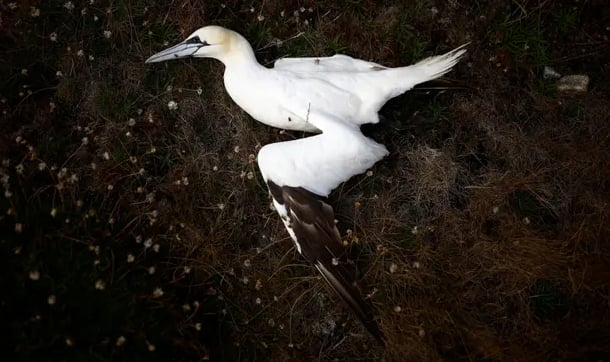June 17, 2025 | 04:51 GMT +7
June 17, 2025 | 04:51 GMT +7
Hotline: 0913.378.918
June 17, 2025 | 04:51 GMT +7
Hotline: 0913.378.918

A northern gannet lies dead on a beach in Brittany, France, in September. Photo: Stéphane Mahé
The planet is experiencing a new “Silent Spring” of wildlife destruction because so many wild birds have died from avian flu, according to a leading scientist, who said the past year has seen the most significant and sudden loss of birds in decades.
James Pearce-Higgins, director of science at the British Trust for Ornithology, said: “The last time we experienced such large-scale and rapid losses of wild birds in the UK would be the impacts of DDT on birds of prey in the 1950s and 1960s associated with the Silent Spring narrative, or the widespread declines of farmland birds during the 1970s and 80s as a result of agricultural intensification.”
The Silent Spring narrative refers to the seminal 1962 book by Rachel Carson about how pesticides, particularly DDT, were killing birds. DDT caused egg shells to become so thin that adults crushed them during incubation, leading to nest failure and the deaths of thousands of birds.
The World Organisation for Animal Health estimates that more than 50,000 wild birds have died of the highly pathogenic avian influenza H5N1 since October 2021, mainly in Europe and America. But experts say this is likely to be a huge underestimate. In the UK alone, numbers could be in the hundreds of thousands, although conservationists say the true impact is still unknown, and most are unwilling to speculate.
In the UK, the effects of avian flu started in the northernmost islands of Scotland in spring, spreading south down the east coast of England reaching as far south as Sussex, with colonies of nesting seabirds the worst hit.
Already there are more than a dozen outbreaks dotted across the country among wintering waterbirds. This suggests it is already widespread and will be found in breeding seabird colonies again next year, said Pearce-Higgins.
There were more than 3,500 virus detections in wild birds across Europe in the 2021-2022 season, with reports from 37 countries that it was being seen in 63 wild bird species, according to an avian influenza overview published by the European Food Safety Authority. For wild birds, Germany, France, the Netherlands and the UK had the most reported cases, with most coming from coastal areas because seabirds were the worst affected.
The first US case in this current outbreak was in an American wigeon duck in South Carolina on 14 January 2022. Since then, there have been 3,700 positive tests in 47 states, according to the US Centers for Disease Control and Prevention.
Yet testing should not be taken as an indicator of impact, because only a fraction of birds that die will be collected and sent for laboratory testing, researchers say. “Reported numbers are likely a vast underestimate,” said Michelle Wille from the University of Sydney.
“For example, of the approximate 8,000 sandwich terns that died in the Netherlands, only a handful are included in the official numbers – in this case a more than 200x difference between reported numbers and observed. The lack of appreciation for the scale of wild bird mortality is concerning as there may be species/population level ramifications.”
Globally, most reports are coming from Europe, and then America, according to UN mapping data, but the disease has also spread through Africa and Asia. In November this year, bird flu was found in South America, with concerns that it will reach the Galápagos. Scientists suspect that a migratory Franklin’s gull brought the subtype H5N1 from the US. More than 13,000 seabirds died, including more than 5,500 pelicans in Peru.
It has since spread to five countries in South America, according to the Pan American Health Organization. “The high-pathogenicity avian influenza outbreak recently reported for coastal Peru is a severe situation … evidence has shown the possibility of the virus spreading among other groups of birds,” said Luis German Naranjo, the conservation director at WWF Colombia.
The UK has about 60% of the world population of great skua and northern gannets. Both have seen “unprecedented levels of mortality”, said Pearce-Higgins, with population impacts likely to last decades as they are long-lived, slow reproducing species.
Experts say the picture will become clearer in the coming years, as we see how many migratory seabirds come back to breed, giving a better idea of how many died.
(The Guardian)

(VAN) Extensive licensing requirements raise concerns about intellectual property theft.

(VAN) As of Friday, a salmonella outbreak linked to a California egg producer had sickened at least 79 people. Of the infected people, 21 hospitalizations were reported, U.S. health officials said.

(VAN) With the war ongoing, many Ukrainian farmers and rural farming families face limited access to their land due to mines and lack the financial resources to purchase needed agricultural inputs.

(VAN) Vikas Rambal has quietly built a $5 billion business empire in manufacturing, property and solar, and catapulted onto the Rich List.

(VAN) Available cropland now at less than five percent, according to latest geospatial assessment from FAO and UNOSAT.

(VAN) Alt Carbon has raised $12 million in a seed round as it plans to scale its carbon dioxide removal work in the South Asian nation.

(VAN) Attempts to bring down the price of the Japanese staple have had little effect amid a cost-of-living crisis.